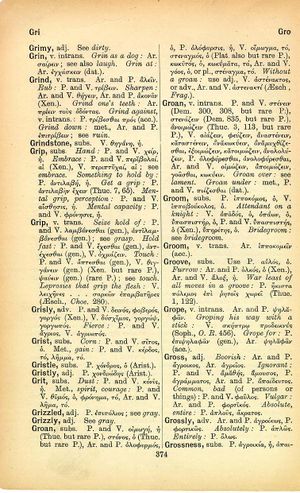gross: Difference between revisions
From LSJ
Λεύσσετε, Θήβης οἱ κοιρανίδαι τὴν βασιλειδᾶν μούνην λοιπήν, οἷα πρὸς οἵων ἀνδρῶν πάσχω → See, you leaders of Thebes, what sorts of things I, its last princess, suffer at the hands of such men
(Woodhouse 3) |
(CSV4) |
||
| Line 1: | Line 1: | ||
{{ | {{Woodhouse1 | ||
| | |Text=[[File:woodhouse_374.jpg|thumb|link={{filepath:woodhouse_374.jpg}}]]'''adj.''' | ||
<b class="b2">Boorish</b>: Ar. and P. [[ἄγροικος]], Ar. [[ἀγρεῖος]]. | |||
<b class="b2">Ignorant</b>: P. and V. [[ἀμαθής]], [[ἄμουσος]], P. [[ἀγράμματος]], Ar. and P. [[ἀπαίδευτος]]. | |||
<b class="b2">Common, bad</b> (of persons or things): P. and V. [[φαῦλος]]. | |||
<b class="b2">Vulgar</b>: Ar. and P. [[φορτικός]]. | |||
<b class="b2">Absolute, entire</b>: P. ἁπλοῦς, [[ἄκρατος]]. | |||
}} | }} | ||
Revision as of 09:42, 21 July 2017
English > Greek (Woodhouse)
adj.
Boorish: Ar. and P. ἄγροικος, Ar. ἀγρεῖος. Ignorant: P. and V. ἀμαθής, ἄμουσος, P. ἀγράμματος, Ar. and P. ἀπαίδευτος. Common, bad (of persons or things): P. and V. φαῦλος. Vulgar: Ar. and P. φορτικός. Absolute, entire: P. ἁπλοῦς, ἄκρατος.

